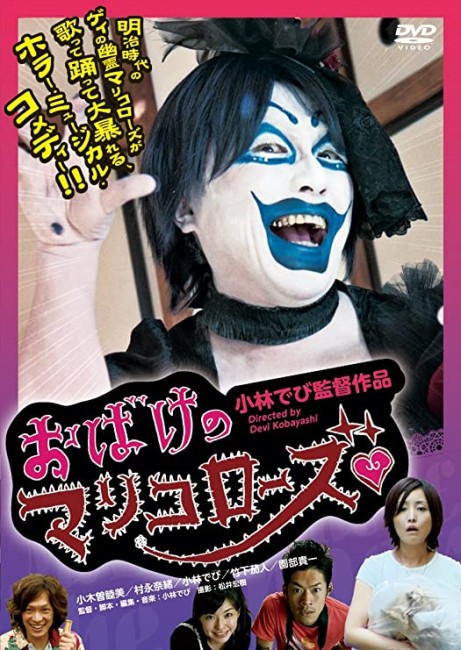(Obake no Mariko Rozu)
Japan. 2009.
Crew
Director/Screenplay/Music – Devi Kobayashi, Photography – Hiroki Matsui.
Cast
Mutsumi Ogiso (Negiko), Devi Kobayashi (Mariko Rose), Nao Muranaga (Eiko), Kiichi Sonobe (Kimijima)
Plot
Negiko, a depressed Tokyo lesbian, is about to kill herself when Mariko Rose, the ghost of a man in drag, appears and implores her not to do so. Negiko explains that she has an unfulfilled crush on her workmate Eiko but Eiko has a boyfriend Kimijima. Negiko learns that Mariko Rose was a former Japanese general who became Japan’s first drag queen. He set up Tokyo’s first gay bar before committing suicide 99 years ago out of unrequited love and has lived as a ghost in the apartment ever since. Mariko Rose explains to her how life as a ghost is a lonely one. They come up with a plan for Negiko to get together with Eiko – Negiko will invite Eiko over for the night claiming to be scared because of the haunted apartment, Mariko Rose will provide the scares and Negiko will use this as an excuse to fall into Eiko’s arms and kiss. The plan is thrown awry when Eiko brings Kimijima with her and when Mariko Rose decides that Kimijima is the likeness of his lost love.
Mariko Rose the Spook is a rare Japanese entry into Queer Cinema – the name that gay-focused cinema almost always made by gay directors and actors has chosen for itself. While I can’t say I am exhaustively informed on the topic, Queer Cinema does not seem to have the same presence in Japan as it does in the West. One is not sure whether desires to challenge social norms lacks the strong underswell in Japan as it does in Western countries. It is not that the subject is taboo, just muted, and there have been various entries on the topic – see The Family Complete (2010) for one other genre example.
Mariko Rose the Spook comes from the relatively unknown gay Japanese filmmaker Devi Kobayashi (who is for some reason is listed as Debi Kobayashi and a woman on the IMDB). The only other film that Kobayashi appears to have made is the short film Hikari (2011), which screens before Mariko Rose, an absurdist film about a woman who believes that she does not fit in until a UFO in the form of a man in a glowing tutu pops down out of the sky. In both films, Devi Kobayashi plays the flamboyant central character – the titular drag queen Mariko Rose here and the personification of the UFO in Hikari. Kobayashi even appeared to film festival audiences around the world dressed as Mariko Rose where he would sing the songs he performs in the film.
By and large, Queer Cinema is not that well represented on this site either. This denotes no particular prejudice on the part of this reviewer – rather the paucity of material that falls into the science-fiction, horror and fantasy genre that is this site’s purview. If it’s out there, bring it on – I’m happy to review it. Mariko Rose the Spook is one example that does. Imagine a weird mix of a gay film and something like Ring (1998) or Ju-on: The Grudge (2003). Well maybe the Grudge connection is stretching it – perhaps something more like a comedic take on Ring/The Grudge where instead of Sadako the ghost is a flamboyant man in traditional Japanese geisha drag.
The first half of the film’s fairly short running time (66 minutes) plays out as a static drama between Devi Kobayashi’s Mariko Rose and Mutsumi Ogiso’s depressed lesbian where the drama never moves much out beyond two people in an apartment. There is amiable comedy generated in some of Mariko’s reactions and pieces of advice. Devi Kobayashi takes the opportunity to play to the gallery with flamboyantly entertaining regard.
Mariko Rose the Spook finds its appeal during the second half where the seance takes place and the carefully laid plans to get laid go awry. Devi Kobayashi gets particularly manic while performing the hauntings – at one point, even tickling Kiichi Sonobe’s nipples in a frenetic blur (don’t ask!). Directorially, Kobayashi has fun here puncturing the cliches of the kaidan eiga (Japanese ghost story) and serving up comic mishaps. The only disappointment of the film is the ending where true girl-girl love fails to win out and Mutsumi Ogiso merely settles for being best friends with Nao Murunaga – something that with her apologising in advance for any opportunities where she may decide to kiss Nao, seems just a tad needy and stalkerish and not exactly something where you place a great faith in this newfound BFF lasting until their mutual dying days.
Trailer here

